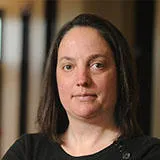Please note: this event has passed
Haunting Biology: Science and Indigeneity in Australia by Professor Emma Kowal is an urgent account of the history of Western biological research on Indigenous Australians and its legacies in contemporary genomic research, including research conducted by Aboriginal and Torres Strait Islander scientists. Attentive to the materialities of blood, bones, and hair that have informed comparative anatomy as well as that of genetic samples, Kowal illuminates ghostly presences that are unresolved in the study of Indigenous biology in the 21st century.
This book event will feature a short presentation by the author Professor Kowal (Deakin University), followed by responses from Dr Ros Williams (University of Sheffield) and Professor Amade M’charek (University of Amsterdam). The discussion will be chaired by Professor Anne Pollock, King’s College London.
The discussion will be followed by a drinks reception. Guests will also be able to purchase a signed copy of the book during the event.
This event is supported by the King’s-Australia Partnership Seed Fund. It is also co-sponsored by the King’s Race Research Network.
About the speakers
Professor Emma Kowal is Alfred Deakin Professor of Anthropology at Deakin University, author of Trapped in the Gap: Doing Good in Indigenous Australia, and coeditor of Cryopolitics: Frozen Life in a Melting World.
Dr Ros Williams is a Senior Lecturer in Digital Media and Society at the University of Sheffield whose work spans across Science and Technology Studies (STS), critical media studies, sociologies of race and ethnicity, and of health and illness.
Professor Amade M’charek is Professor of Anthropology of Science at the University of Amsterdam. Her research interests are in forensics, forensic anthropology and race.
Professor Anne Pollock is the Head of Department of Global Health & Social Medicine at King's College London. Anne’s research explores feminist, anti-racist, and postcolonial engagements with science, technology and medicine.
Event details
River RoomKing's Building
Strand Campus, Strand, London, WC2R 2LS

